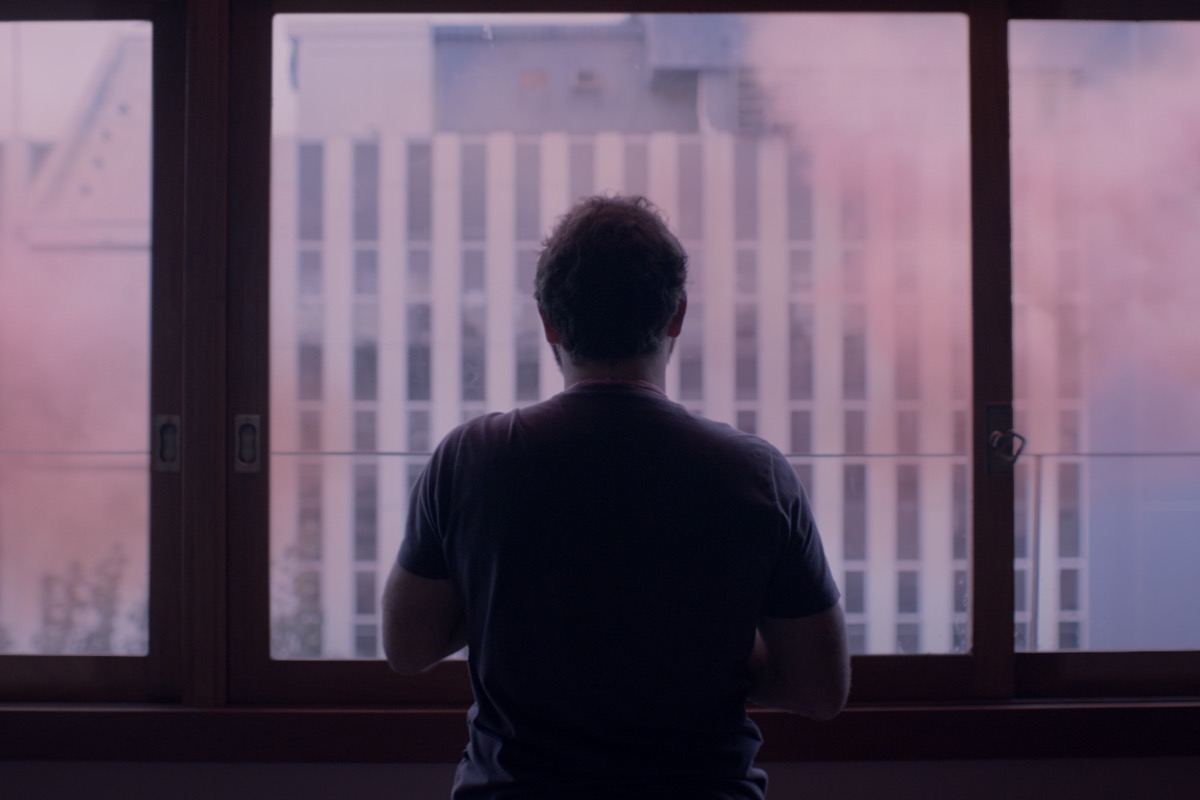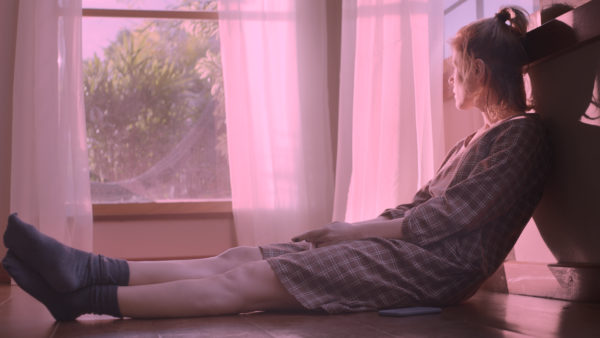

Eduardo Mendonça as Yago in ‘The Pink Cloud’ (Prana Filmes/O2 Play)
Written in 2017, shot in 2019, and premiering at New York’s Quad Cinema on January 14, the Brazilian film The Pink Cloud explores what happens when a deadly phenomenon forces the whole world indoors immediately and indefinitely.
Sound familiar? Yes, this 2021 Sundance Film Festival Selection is oddly prescient about the pandemic, but its insights go beyond its premise.
I spoke with filmmaker, writer, and director Iuli Gerbase, who described her film as a “drama with sci-fi and surrealistic elements.” When she first began working on it, she was interested in the theme of “confinement,” but like the rest of us, she never thought we’d all be able to relate to her characters and their situation so profoundly just a few months later.
The Pink Clouds starts when Giovana (Renata de Lélis) wakes up next to Yago (Eduardo Mendonça) after a casual hookup. There’s an emergency alert, telling everyone to go inside. Pink clouds of unexplained original are floating around, and just 10 seconds of exposure to them will kill you. It’s actually worse than what we’re going through because there’s no ability to create intentional pods—you’re just stuck wherever you happened to be. It also last years, with very few accommodations. In a truly damning critique of where we are as a society, drones eventually install tubes so capitalism can carry on, but no one figures out how to resume human contact. The characters can’t even open their windows.
So while it’s an extreme version of a pandemic, it’s still an experience many audience members will recognize as their own.


Renata de Lélis as Giovana in ‘The Pink Cloud’ (Prana Filmes/O2 Play)
Unlike other recent apocalyptic fairs like Don’t Look Up, The Pink Cloud is intimate in its storytelling. Its characters are regular people, affected by world events rather than influencing them. They are the powerlessness many—you know, us, the vast majority who aren’t meeting with presidents or making major scientific breakthroughs.
Having presented the film around the world, mostly virtually but with some in-person screenings this summer, Gerbase says “it’s amazing that people can relate to the film from Russia, Japan, Korea, Romania… It’s crazy—the pandemic did that.” She also notes that while the film focuses on Giovana and Yago, it peaks into other apartments, hinting at how others are also suffering, whether it’s Giovana’s sister, Yago’s dad, their pre-cloud friends, or their post-cloud online acquaintances.
With this combination of stories, The Pink Cloud delivers its most crushing insight: that emergency confinement, rather than setting us free from the social norms that now limit us, actually increases those norms.
Giovanna starts out as a self-possessed woman, sure she never wants the traditional woman’s role of wife and mother. Stuck in the apartment with Yago, though, she loses that option. It’s like “the pink cloud is making her do things that she doesn’t want to do.” Without the regular paths of resistance —be they as simple as gathering with friends or physically separating from a partner— she gets caught in the old script about what is supposed to make her happy. Surely, her plight will resonate with the nearly three million women in the United States who’ve dropped out of the labor market during the pandemic and have yet to return.
And Giovanna arguably has it easier than her counterparts. Yago is kind and optimistic, if not a great match. In contrast, Giovanna’s teenage sister Júlia (Helena Becker) is at a sleepover with friends when the cloud appears and is stuck with an abusive patriarch who starts by restricting his ward’s food before eventually impregnating the girls in his care. Friend Sara (Kaya Rodrigues) is alone, forced into solitary confinement that no robotic puppy or video call can alleviate.
It’s grim. But as our actual world enters Year Three of a real pandemic, it’s oddly comforting to have film reflect the hardships we’re all enduring and provide some much-needed catharsis.
Hopefully, The Pink Cloud is only start for Gerbase—although she most likely will have to exit the filmmaking system in her native Brazil to continue her work. She is keenly aware that President Jair Bolsonaro, whom Gerbase describes as “terrible,” has cut almost all film financing, a lifeblood for Latin American filmmakers who struggle to find their footing in Hollywood. Which means Brazilian artists like her will be more isolated, less able to make their voices heard, trapped by their own pink clouds.
The Pink Cloud opens at the Quad in New York on January 14 and the Laemmle Monica Film Center in Los Angeles on January 21. It debuts on streaming services March 1.
***
A writer and activist, Cristina Escobar is the co-founder of latinamedia.co, uplifting Latina and gender non-conforming Latinx perspectives in media. She’s a member of the Latino Entertainment Journalists Association and writes at the intersection of race, gender, and pop culture. Twitter: @cescobarandrade


